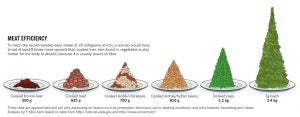Eating a diet based on fruits, vegetables, protein such as meat, nuts, and eggs, and some whole grains are part of a healthy balanced diet. I always liked the phrase, “If you can’t pick it or kill it, don’t eat it,” as a healthy food philosophy, and it’s recommended you should get 20 percent of your daily calories from lean protein.
Peer reviewed evidence published in PLoS ONE explains that access to a diet rich in animal protein high in B vitamins suggests that women can wean their offspring sooner and have more children. Meat is rich in iron, which is crucial for the development and growth of the brain while in the womb. Meat has also played a vital role in brain development, where research shows the brain had grown with a meat based diet historically with human evolution.

About 2.6 million years ago, meat first became a significant part of the pre-human diet, and research done on skulls of early hominids claim that regular meat consumption led to the change of the human skull. It has more calories and fat, requires less chewing and has far more nutrients overall as compared to a meatless diet and prevents muscle loss and improves muscle strength, repair, and maintenance.
Meat is packed full of nutrients like iron, zinc, selenium, magnesium, vitamins A, D, B12, and fatty acids. These vitamins promote good vision, stronger teeth and bones, support the central nervous system, and promote overall mental health. Although plants may also contain of the same nutrients, they’re in much lower quantities and often in a form that humans can’t always use. For example, red meat is rich in iron from hemoglobin, which is better absorbed by the body as opposed to iron found in beans or leafy greens, which can also prevent anemia. Meats contain all the essential amino acids and ranks as a top source of protein, while controlling blood sugar and improving cardiovascular function.

Research from the University of Montreal and its affiliate CHU Sainte-Justine hospital found the amino acid asparagine is extremely important for brain development. Asparagine may improve metabolism, improve stress and fatigue, and promote smooth functioning of the liver, among other health benefits. These amino acids found in meat are essential for neurotransmitter health. Neurotransmitters are internal chemical “messengers,” which regulate many of our bodily functions.
I recently attended the Alltech ONE conference in Lexington, Kentucky, and heard from Dr. Majid Fotuhi, a neurologist and neuroscientist, who explained that there are ways to enlarge your brain today. The hippocampus is the part of the brain that enhances memory and knowledge. The best ways to improve brain health are to exercise, get at least eight hours of sleep, eat a diet rich in omega 3’s and DHA (or the Mediterranean diet), and have a purpose in life. Always be learning something new. Avoid junk food, obesity or stress.
So, how do we go about this? How do we avoid Alzheimer’s disease, improve our brain health, and live better overall? Scientifically, the root of a diet rich in these minerals and nutrients and a key component for brain health is to eat more meat.
Michelle Miller, the Farm Babe, is an Iowa-based farmer, public speaker, and writer, who lives and works with her boyfriend on their farm, which consists of row crops, beef cattle, and sheep. She believes education is key in bridging the gap between farmers and consumers.



